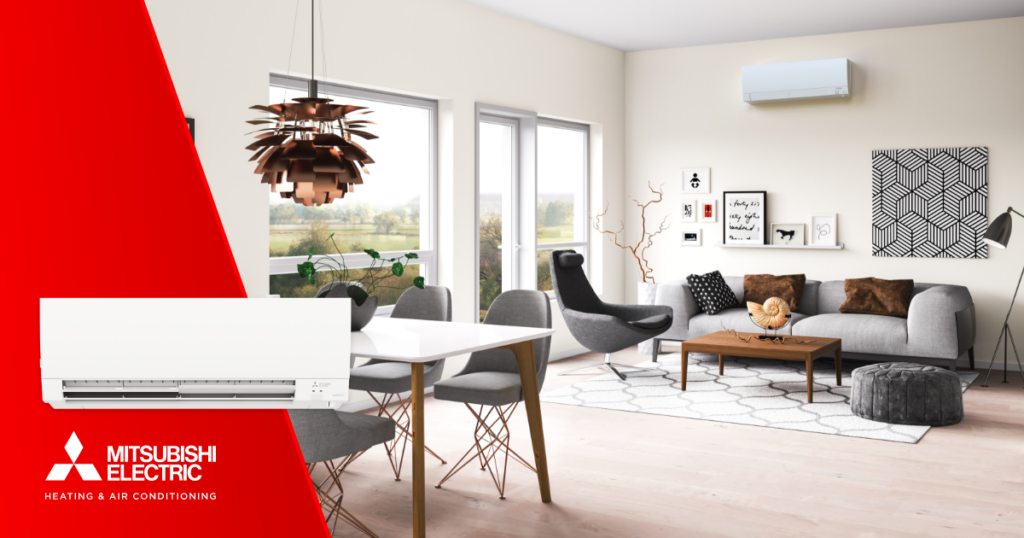
Mitsubishi is a trusted brand when it comes to installing a mini-split system in one’s Brooklyn or Manhattan home. Whether it is a small apartment in Manhattan or an Upstate residence, Mitsubishi ductless mini-split systems are gaining popularity across all kinds of New York homes. The reasons are a few for example their energy efficiency, flexible zoning capabilities, and quiet operation. However, as more homeowners install them, a common issue has also emerged—excess indoor humidity. Hence, if Manhattan and Brooklyn residents want to make the best of these systems, they also have to know how to handle the humidity problem.
While Mitsubishi mini-splits are known to effectively cool and heat spaces, many users report issues with damp, sticky air during humid New York summers. It is more than a comfort concern—uncontrolled humidity can affect indoor air quality, damage one’s home, and put a financial strain on one’s energy bills. However, there is no reason to feel concerned. There are ways to handle the issue. Let’s explore why Mitsubishi mini-splits may struggle with humidity and how to fix it.
Why Mitsubishi Mini-Splits May Struggle with Humidity in Manhattan and Brooklyn Homes
Despite their reputation for efficiency, Mitsubishi mini-splits can falter in controlling humidity if not properly configured or maintained. Here are some of the most common reasons:
- Short Cycling in Oversized Systems: If the unit is too large for the room, it will cool quickly and shut off before adequately removing moisture from the air.
- Improper Installation or Configuration: Incorrect refrigerant charge, poor drainage setup, or a poorly positioned indoor unit can all hinder humidity control.
- Cooling-Only Settings: Using the “Cool” mode constantly, rather than “Dry” or “Auto,” limits the system’s ability to dehumidify efficiently.
- Dirty Filters and Coils: A buildup of dust or debris restricts airflow and reduces the unit’s ability to condense and remove humidity.
- Basic Models Lacking Features: Entry-level Mitsubishi models might not have advanced humidity sensors or dehumidification modes built-in.
How High Humidity Affects Your Home
Humidity isn’t just uncomfortable—it can wreak havoc on one’s living space:
- Mold and Mildew Growth: Muggy summers in Brooklyn or Manhattan create the perfect environment for spores to thrive, especially in poorly ventilated areas.
- Wood Damage and Peeling Paint: Moisture seeps into woodwork, warping floors and causing paint to bubble or flake.
- Sticky, Uncomfortable Air: Even if the thermostat reads 72°F, high humidity can make your home feel warmer and more oppressive.
- Worsened Allergies: Humid air increases dust mites and mold allergens, which can aggravate respiratory conditions.
Troubleshooting Tips for Mitsubishi Mini-Split Humidity Problems
If the Mitsubishi system isn’t tackling humidity like it should, then homeowners need to carry out a few checks:
- Check and Clean Filters Regularly: Dirty filters need to be changed as it can reduce airflow and efficiency. It is essential to clean them monthly during peak usage.
- Verify System Size: An HVAC professional can confirm whether the unit is properly sized for the space. Oversized systems are a common culprit.
- Use the ‘Dry Mode’ Setting: Ideal for spring and fall when temperatures are mild but humidity remains high.
- Have Refrigerant Levels Checked: Low refrigerant impairs moisture removal and may indicate a leak.
- Schedule Annual Maintenance: Regular service includes coil cleaning and drain line inspections to ensure efficient operation. One needs to carry out ductless air conditioning repair in Manhattan and Brooklyn as and when needed.
When to Call a Professional HVAC Technician
Some issues require expert attention. Contact a qualified HVAC technician for ductless air conditioning repair in Manhattan and Brooklyn if:
- Humidity consistently stays above 60% even when cooling.
- You notice water leaking from the indoor unit or suspect a clogged condensate drain.
- Your mini-split short cycles or never seems to shut off.
- You think the unit may have been incorrectly sized or installed.
Can a Mitsubishi Mini-Split Be Upgraded for Better Humidity Control?
Yes—there are several ways to improve the mini-split system’s humidity management:
Newer Mitsubishi Models: Homeowners can invest in newer systems that come with built-in humidity sensors and smarter controls.
Whole-Home Dehumidifiers: These work alongside the mini-split system and are especially useful in larger or multi-room homes.
Smart Thermostats & Zoning Controllers: Advanced controls allow for better climate and humidity management in different zones.
Inverter-Driven Compressors: Many Mitsubishi models use inverter technology that can adjust output and remove humidity more consistently.
Why This Matters for Homeowners in Brooklyn or Manhattan
New York presents unique climate challenges. Summers bring high humidity, while winters demand efficient heating. Manhattan and Brooklyn apartments may require smaller, quieter units, while larger homes Upstate need more robust zoning and humidity control.
Mitsubishi mini-splits are an excellent HVAC solution for New York homes, but they’re not foolproof. Proper installation, regular maintenance and ductless air conditioning repair in Brooklyn and Manhattan and the right settings are essential to keep humidity under control. When in doubt, it is necessary to consult a professional HVAC technician familiar with the local climate and building codes.

Over 35 years of experienced HVAC engineer and blogger with years of experience writing about various topics related to multiple types of HVAC systems installation, repair, and maintenance. I have been in this industry since my apprenticeship in 1985. Our team emphasizes quality workmanship while ensuring customer satisfaction is our top priority.




Leave a Reply
You must be logged in to post a comment.